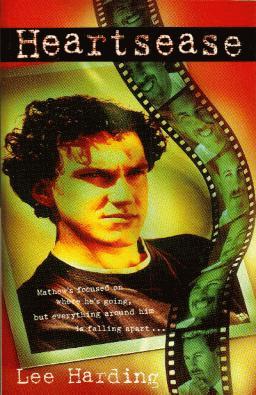
Heartsease by Lee Harding, 1997
Bluegum edition 1997

When you begin reading any book or magazine story written by Vance Palmer, you may do so with the comfortable feeling that you are going to be well satisfied when you reach the end. There is nothing erratic about his literary work; it is level, flawless and polished, like a table made from Queensland silky oak by a cabinet-maker who takes pride in his trade. Vance Palmer is an accomplished journeyman -- a craftsman in words who has served his apprenticeship thoroughly, and has mastered his trade, giving you guaranteed good value for money when you buy what he has made with his pen. "A typical Vance Palmer four-square yarn," means a story well constructed, written with care, with no loose ends in the plot, and no slovenly phrasing. His name on a book is a trade mark that you can trust.
Discussion of the major Australian novelists of to-day invariably begins with the brilliant constellation of women writers who have come to the fore in recent years. Henry Handel Richardson, Brent of Bin Bin, Katherine Prichard, Velia Ercole, Barnet Eldershaw, G. B. Lancaster, Alice Rosman, Helen Simpson -- a surprisingly strong list of Australian writers -- to begin with, all known and respected in England and America -- and all women! The discussion turns to men writers. Invariably someone says, 'Well, there is Vance Palmer. . . ' His name comes first to mind. With Dale Collins and Jack McLaren he has presented the Australian theme to English and American readers in a certain virile, straight forward, sincere and unassuming way that lacks the wild emotional force of the woman writers but is no less convincing and genuinely Australian for that. Here is the Australian male in literature, modern but capable and full of a quiet strength, as he is in life.
Like the "Champion Ringer" famed in western shearing sheds, Vance Palmer comes from Queensland. He was born in Bundaberg, the sugar-town at the mouth of the Burnett River. In his early and impressionable youth he must have seen the picturesque gangs of Kanakas cutting the tall green cane and singing their deep-voiced Island songs as they flashed the broad cane-knives, in the sunlight. He would have seen, too, the white labourers, the roughest-mannered but physically the most perfect speciments of masculinity to be found anywhere on the earth, arriving at the cane fields after shearing sheds were cut out, for a few months' big pay and desperately hard work, "cane-slogging." Perhaps he saw fights and riots between Kanakas and white labourers, or watched great muscled timber fellers, stripped to the waist, sweating in the sun as they cleared the jungle from the Isis scriblands, revealing the rich, red volcanic loam where in more and more sugar cane was to be planted. Perhaps, too, he went to the Sand Hills, where the Burnett River flows out to the ocean, and watched the gulls planing over the dunes where another young native of Bundaberg, Bert Hinkler, made and flew box kites the size of aeroplanes even before the triumphs of Wilbur Wright and Bleriot. And no doubt in the Burnett River young Palmer caught eeratodi, the archaic fish that can live out of water, and are found only in that stream.
Colour, strength, romance, during the impressionable age of childhood gave him a background for his writing which he has never lost, for all his later sophistication and urbanity, and world-travelling, and painfully acquired "literariness." Asked recently to express an opinion on Australia as a literary theme. Palmer replied:
"A man can only write about the life he knows. If he is an Australian he will naturally take his themes from his own country. I have written countless magazine stories set in places as far apart as China and Mexico, but I wouldn't attempt any serious work set in those countries -- they don't stimulate my deepest interest. Australia can provide all the themes required by any writer who knows his country."
There is a brave and heartening declaration from one who has travelled all the world, and proved himself a master of the literary trade! Vance Palmer has been four times to London on literary business, and once on the business of the A.I.F. He spent a year travelling through Russia and Siberia, in the days before the revolution, incidentally learning much about his job of writing from the works of the great Russian masters, Tolstoi, Gorki, Dostoevski, Poushkin -- all geniuses of narrative style and psychological insight. He has sojourned in the colourful East, and has lived through the uncertainties, terrors and comedy of a revolution in Mexico. Yet always he has returned to Australia, and in his serious work it is always of Australia that he writes. His early days in Bundaberg, and at the Ipswich Grammar School (Queensland's "Athens"), the days which he spent as a jackeroo on a Western Queensland cattle station, and what he noticed when living on the edge of the crashing surf at Caloundra, near Brisbane, or during the year which he spent recently on Green Isand, near Cairns, on the Barrier Reef -- these essentially Australian experiences have given him and will continue to give him, the inspiration for his best work.
His books, like those of all the best Australian authors, are difficult or impossible to obtain from Australian book sellers; who will offer you, instead, English "throw-out" lines if you ask for decent reading matter. Something will be done about this, no doubt, when Australian publishing gets firmly established. The best of Vance Palmer's novels, all recently published in England, are "The Man Hamilton" (1908), "Men are Human" (1930), "The Passage'' (1930), and "Daybreak." "Men are Human" and "The Passage" were "Bulletin" prize-winners. A collection of his short stories, entitled "Separate Lives," was published in 1931; and a book of plays entitled "The Black Horse" was issued in 1924.
He is one of the foremost of the gallant band who are endeavouring to convince the Australian public that Australia as a country is interesting to read about. "It will probably take a lot of writing, of the highest class," he says, "to convince Australians that their life is as interesting as any other."
Vance Palmer's work is of the "highest class," and we are proud of him for that reason.
First published in The West Australian, 20 May 1933
[Thanks to the National Library of Australia's newspaper digitisation project for this piece.]
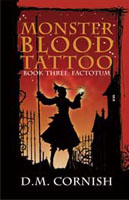 | Factotum, the third book in D. M. Cornish's Monster Blood Tattoo series has now finally been published. The author spoke to the "SFRevu" website: |
SFRevu: The story you've written--about Rossamünd Bookchild and his path to self-knowledge, in a fascinating world full of exotic individuals, monstrous dangers and astounding settings--is a true epic. How did you set about writing this adventure?Other book covers:
Cornish: One word at a time, forming into one sentence at a time, gathering in to one paragraph at a time, slowly accreting into a chapter, into an entire novel. Writing feels like internal juggling, like there is a thousand balls in the air and I have to keep each one up or all will fall.
During the whole process I have been very aware of making sure my style of writing in some way fitted the setting, that the texts read in some part as if they may have well come from the Half-Continent themselves, that they were written by a denizen of that place - which in a way I suppose they are.
SFRevu: What sorts of stories influenced or inspired you, specifically in terms of TFT?
Cornish: Hmm, no surprises, the first to be named is Mr Tolkien's little set, LotR, in close combination with Mervyn Peake's Gormenghast novels: E.R. Eddison's The Worm Ouroboros, H.P. Lovecraft's The Curious Case of Charles Dexter Ward (and everything else he has ever written), Frankenstein, anything by Kafka, Mr Steinbeck's Cannery Row and Sweet Thursday, Steppenwolfe by Hesse, The Last of the Mohicans and Deerstalker by James Fennimore Cooper, King Solomon's Mines by H. Rider Haggard, The War of the Worlds by H.G. Wells (and everything else he has done), Poe, Where the Sidewalk Ends by Shel Silverstein, Where the Wild Things Are by Maurice Sendak, The Great Gatsby by F. Scott Fitzgerald.
Having C.S. Lewis's Narnia series read to me as a child, and also his book Out of the Silent Planet and the two other books that are a part of that series. Batman: The Dark Night Returns by Frank Miller and Klaus Janson, Akira by Katsuhiro Otomo, Elektra: Assassin by Frank Miller and Bill Sienkiewicz, Mythago Wood by Robert Holdstock, Homer's Iliad, anything by Ms. Austen (except perhaps Mansfield Park - I like her when she is being less acid), all the wonderful monsters in Orion by Masamune Shirow, Nausicaä by Hayao Miyazaki, Master & Commander by Patrick O'Brian (and the entire Aubrey/Maturin series - though only after a reviewer in the Washington Post mistook him as an influence on my writing when reviewing Foundling (TFT Book 1)).
Let's see, what else? Avenues & Runways by Aidan Coleman, Our Language by Simeon Potter, Batman: The Killing Joke by Alan Moore and Brian Bolland. I could go on and on but I have to stop somewhere...
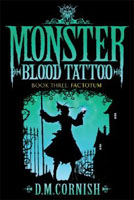 | 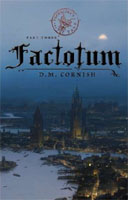 | |
| UK edition | US edition |
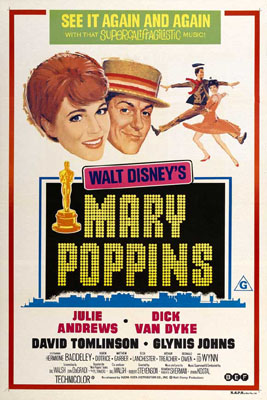
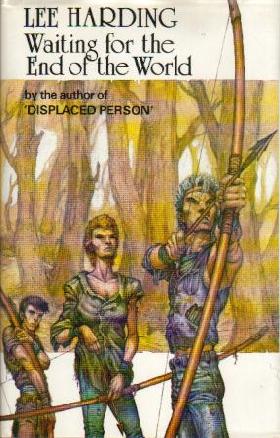
He longed to be a Back-Blocks Bard,
And fame he wished to win --
He wrote at night and studied hard
(He read THE BULLETIN);
He sent in "stuff" unceasingly,
But couldn't get it through;
And so, at last, he came to me
To see what I could do.
The poet's light was in his eye,
He aimed to be a man;
He bought a bluey and a fly,
A brand new billy-can.
I showed him how to roll his swag
And "sling it" with the best;
I gave him my old water-bag,
And pointed to the west.
"Now you can take the train as far
As Blazes if you like --
The wealthy go by motor-car
(Some travellers go by bike);
They race it through without a rest,
And find it very tame --
But if you tramp it to the west
You'll get there just the same.
"(No matter if the hour is late,
The morning goes Out-Back),
You do not need a dog nor mate,
You'll find them on the track.
You must avoid such deadly rhymes
As 'self' and 'elf' and 'shelf'.
But were it as in other times,
I'd go with you myself.
"Those days are done for me, but ah!
On hills where you shall be,
The wattle and the waratah
Are good to smell and see.
But there's a scent, my heart believes,
That 'travellers' set higher
Than wattle -- 'tis the dried gum leaves
That light the evening fire.
"The evening fire and morning fire
Are one fire in the Bush.
(You'll find the points that you require
As towards the west you push.)
And as you pass by ancient ways,
Old camps, and mountain springs,
The spirits of the Roaring Days
Will whisper many things.
"The lonely ridge-and-gully belt --
The spirit of the whole
It must be seen; it must be felt --
Must sink into your soul!
The summer silence-creek-oaks' sigh --
The windy, rainy "woosh" --
'Tis known to other men, and I --
The Spirit of the Bush!
"So on, and on, through dust and heat,
When past the spurs you be --
And you shall meet whom you shall meet,
And see what you shall see,
You need not claim the stranger's due,
They yield it everywhere,
And mateship is a thing that you
Must take for granted there.
"And in the land of Lord-knows-where --
Right up and furthest out --
You find a new Australia there
That we know nought about.
Live as they live, fight as they fight,
Succeed as they succeed,
And then come back again and write
For all the world to read."
I've got a note from Hungerford,
'Tis written frank and fair;
The bushman's grim philosophy --
The bushman's grin are there.
And tramping on through rain and drought --
Unlooked for and unmissed --
I may have sent to furthest out
The Great Bush Novelist.
First published in For Australia (1906)
Dulcie Deamer has had an adventurous life. She was born in Christchurch, New Zealand, in 1890, her father being a doctor.
She never went to school, her mother being her sole teacher. At the age of eight she was allowed the unrestricted run of her father's fine library, and she read the novels of Lord Lytton and Sir Walter Scott, abhorring -- as she confesses -- all "children's" books. Her hobbies were natural history and archaeology, and whatever books she wanted on these subjects were bought for her. From the very beginning, any information she could obtain concerning the Stone Age drew her like a magnet. She disliked dolls, adored animals, and preferred trees and flowers to the society of other children.
At eleven she began to write verses. A year later her family moved to Featherstone, a tiny bush township in the North Island, and here for five years she ran wild, riding unbroken colts, shooting, learning to swim in snow-fed creeks, and going for long, solitary rambles of explora- tion through the virgin bush. It was here in the thick scrub, where there was always the risk of encountering wild cattle or a wild boar, that what she describes as ''memories of the Stone Age" came to her. And so, when the newly-started 'Lone Hand" magazine startled Australasia by offering a prize of 25 pounds for the best short story submitted to it, Dulcie Deamer, then 16, sent along her first serious prose effort -- a story of the savage love of a cave-man.
It won -- and altered the whole course of her life.
For some years previously her parents had been training her for a stage career. This original idea was not abandoned. At 17 Dulcie Deamer was touring New Zealand with a little company playing melodrama in all the back-block townships. It was thus she met her future husband, Albert Goldie, who was at that time business manager for one of Williamson's companies.
A whirlwind courtship ended in a marriage in Perth, Western Australia -- the bride being not yet 18. Then came a tour of the Far East, with Hugh Ward's London Comedy Company, which her husband was then managing. Here all manner of adventures befell the young actress-authoress. A bomb was thrown into her carriage in the streets of Bombay, where anti-British rioting had broken out.
Luckily it failed to explode. She was caught in another riot in the Temple of Kali, in Calcutta, and only saved by the intervention of a Brahmin priest. A fat Bengalese millionaire, hung with necklaces of pearls the size of broad beans, nearly succeeded in trapping her into his harem, and in China she saw execution grounds littered with freshly severed heads."The $25,000 cash award is given to a writer who has been highly creative over a long period but has not necessarily received adequate recognition. Such writers are automatically eligible without the necessity for submissions."
Previous winners of the award have included Beverley Farmer, David Rowbotham, Jannette Turner Hospital, and Gerald Murnane.
Foster's most recent novel is Sons of the Rumour. The author also won the Miles Franklin Award in 1997 for The Glade within the Grove.
In his acceptance speech on the weekend Foster got stuck into a particular author living in Australia who he believed showed "no class" in continuing to contest literary awards when he had already won two Bookers and a Nobel. Although the author in question was not named it's not too diffcult to figure out who Foster was referring to.
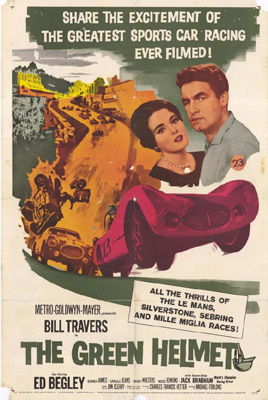
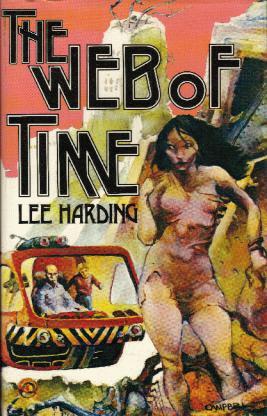
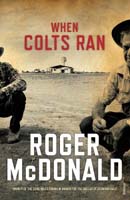 | Roger McDonald's previous novel, The Ballad of Desmond Kale, won the Miles Franklin Award in 2006, so each new book will be greeted with a high degree of expectation. His most recent novel, When Colts Ran, is now published by Random House. The author spoke to "Booktopia": |
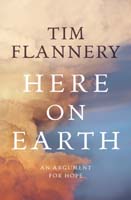 | Tim Flannery, best known for his book The Weather Makers and for his time as Australian of the year in 2007, has released a new title, Here on Earth. On the eve of its release he spoke to Kathleen Noonan from "The Courier-Mail": |
In a new and ambitious book launched recently, Here on Earth: An Argument For Hope, Prof Flannery sets out to chart two histories: the twin stories of our planet and our species. But when he talks about the future of the planet, mining and climate change is never far from the conversation.
In the book, he quotes American ecologist Aldo Leopold: "One of the penalties of an ecological education is that one lives alone in a world of wounds. Much of the damage inflicted on land is quite invisible to laymen."
So, how do the Tim Flannerys of the world stay optimistic in a world of wounds?
In other words, how do scientists looking at the devastating impact of humans on the planet's ecosystems, notably climate change, and not become raging, throw-their-hands-in-the-air pessimists?
He says narrow horizons and short time frames are always misleading and we need to take a long view to see the truth path of our evolutionary trajectory.
"I am hopeful because I am taking the long view. In writing this book, despite the challenges we now face, I feel optimistic for the future for our children and grandchildren. It's only by seeing the planet in that way can you see the potential for hope."
Prof Flannery, the mammalogist and palaeontologist, environmentalist and global warming activist who in 2007 was named Australian of the Year, has spent a lifetime examining the destruction of land and sea. This is his first major work since The Weather Makers in 2005, which argued that, if climate change was not slowed, it would cause mass species extinctions.
Yet, the new book is Prof Flannery's most hopeful writing yet. He says if we survive this century, future prospects will be enhanced.
The book was launched by actor Cate Blanchett in Sydney, and you can watch a video interview with the author from ABC Radio National Breakfast.
Who would not be a poet - to seclude
Himself in a bright, starry solitude,
Away from earthly wretchedness, at will;
Where no unlovely thing might present be,
To dim the light of ideality,
And Nature's glories might surround him still?
Who would not be a poet - to be blest
With the rich thoughts which they in words have drest:
To feel the fire of their undying hopes,
To see all beauty with their gifted sight,
To hang o'er Byron's, Campbell's, Milton's, Pope's,
And Spencer's page, with their divine delight?
Who would not e'n a poet's woes possess,
T' inherit that wild power which beautifies distress?
First published in Australasian Chronicle, 1 June 1841
Fifty-four years is a long way to look back upon, to a little village some few miles outside Montreal where, I am informed, I was born. I have little knowledge of the event, and but little more of the long trek to Zululand, where my father escorted his family when I reached the age of four years. More distinctly, I remember my Zulu playfellows, and the long, long trek to Cape Town, where I was sent to school, at the age of nine.
A family council, when I reached my fourteenth birthday, decided that I would be an ornament to the priesthood, and I departed for London, en route for Maynooth. At that time England, and the United States of America, were awakening to the new jouralism, under the respective guidances of Harmsworth and Hearst. I was attracted, and a great longing to tread the inky way possessed me. In consequence, I stayed in London, completing a sketchy education at night schools, and haunting the newspaper offices of the city by day. To my gratification -- and the surprise of many of the major journalists of that period -- I found within a few months that I could earn bread at it, with, an occasional flavouring of cheese and jam.
Short story writing had long attracted me -- my first fiction story had appeared in a Cape Town newspaper before I reached eleven. In London I found corners in magazines and journals open to my efforts, and this editorial encouragement had disastrous effects on my future; I determined to be an author. I started a magnum opus and -- to buy paper and ink -- cultivated sensational love-story writing in periodicals of the Family Herald Supplement type.
On the outbreak of the Boer War I found I had sufficient money in the bank to pay my fare home -- to South Africa. A fight has always attracted me, and amid the wide-spread battleground of South Africa I found adventure sufficient for an ordinary lifetime. I returned to London with a 100,000 words novel on the war, but publishers are always unkind, ever those of the present century.
My arrival in London was only the jumping-off place. The United States of America was an alluring vision on the horizon -- and I strode for the foot of the rainbow. I landed in New York with exactly nineteen shillings and three-pence in my pocket; a great belief in my own powers; and a store of imagination that won me past the very lax immigration laws of that period.
Followed a period of wandering up and down a country then in the making, and almost as big as Australia. I worked at anything that came to hand, and when work failed to materialise, I was the perfect hobo. Even to-day I remember what particularly hard boot-leather was provided for the train-guards.
And all this time I was writing stories and articles -- and all the time editors and publishers were filling the U.S. mails with my returns. By the time I had reached twenty-five I claimed to have the largest and most varied collection of 'The Editor regrets . ..." in the known world.
Still, I would write. Chance gave me the opportunity to practice journalism, and for a time I walked the streets of big cities, a full-blown reporter. Again the wide spaces called -- I think it was a minor revolution in Panama. Anyway, I went south, to see Spanish America. Some hundreds of days of wild adventures -- the night spent in scribbling; and I awoke to the fact that some thousands of dollars had accumulated in New York to my credit.
I was a capitalist! Naturally, my first thought was to see the world -- up to then I had only partially surveyed Canada, South Africa, England and the United States. The Orient called, but I had no intention of wasting money on fares. In Frisco a friendly master-mariner offered to ship me before the mast of a befouled, much-wandered cargo boat -- and I jumped his offer before he had time to get sober. Then I learned something of the Pacific, as a sailing-pond, and a good deal of the many and varied nationalities it contains. While at Singapore I said good-bye to the vessel, but forgot to take farewell of the captain. He didn't trouble to find me -- I suppose because I had forgotten to collect wages owing me.
Deciding to explore China, by good luck I came into the graces of a high official of the Empire. With him I visited large tracts of that country then unknown to white men. Back to the United States, my head filled with facts and fictions, determined to settle down and become a respectable member of society.
By the time I reached New York again I had less than a dollar in my pocket. Two days spent in examining and approv- ing the alterations made in the city during my absence, and I bethought myself of the treasury -- and the hotel bill that was steadily mounting. Full of thought, I wandered down to the doors of a well-known publishing house -- and hesitated. What had I for sale? It took more than two hours, pacing the block, to frame a satisfactory plot for a serial. Then I chose an editor -- and bearded him in his lair. How I put it over, I don't know; but I do know that I came out of that building with a commission to write a fiction serial then only existing in my mind -- and what was more to the point, with half-payment for the story in my pocket. That story was written in thirteen days -- I'm always fond of 'unlucky thirteen' -- and I was up 250 dollars. Then and there, on a busy side walk, during the busiest hour of the day, I elected myself a serial writer for the great United States of America -- and up to a certain point I made good on my self election.
Through all the earlier days of my life I had been fascinated by crooks -- although at that time I was not using them as material for stories. Opportunity offering, I obtained a place on a newspaper, developing a flair for crime investigation (of the newspaper kind). Now followed some years of peace, my days being devoted to journalism and my nights to fiction writing. Just about the time my banker recognised my entry to his establishment with a welcoming smile, I broke down in health.
Eighteen months of neurasthenia -- more than half that time helpless on a bed. American doctors sent me to England. There the fraternity declared me a hopeless case. Perhaps to get me off their hands with the least trouble, they decided that my only hope was a voyage to Australia. Hospital attendants carried me on board ship, but at Port Said I walked ashore to see the sights. By the time I reached Fremantle, I had decided there was still room in this world for me. I looked at the western capital, and decided that the country was good; also that doctors were bad guessers.
The wander lust urged again, and for quite a time I travelled most of the southern parts of the continent. Then came the war, and I joined in the Great Adventure. Again back to Australia, with an earnest desire to see those parts of it I had previously missed. At that time certain gentlemen were forming the Sydney 'Daily Mail.' One day I wandered into Mr. Gay's offices, and announced that I proposed to walk around Australia, and would he pay for articles on the trip? Mr. Gay was blunt. First he told me exactly how many kinds of fool I was to think of such a trip; then came to an agreement with business-like promptitude. Within a few hours I had gathered together what I thought necessary for an 11,000 miles trip, and had left Sydney. Two and a half years later I came to Sydney again, having in the mean time visited nearly every port on the extensive coastliue. More to the point, I had proved possible a trip quite a number of Sydney wise-heads had declared to be sheer suicide.
First published in The West Australian, 29 April 1933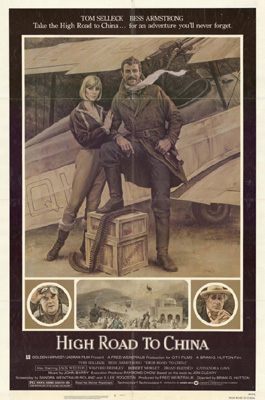
There seems to have been some difficulty. Twain continued:- "I began on one, on the-poem. I have not got the list complete yet. I have got down a lot. I have got emu, kangaroo, jackass, or laughing jackass, and the bell bird, and so on. I have a lot of those, and then I have a list also of the extinct ones-the wonderful extinct ones like the dodo, the boomerang, and the great moa, and the larrikin. I can say now that the most difficult thing in the world to do is to write poetry when you don't know how. You see it is the rhymes that make the trouble, for if you get the sense right, why then there is no word that will rhyme with it. If your rhymes rhyme then there is no sense in it.
"Land of the ornithorhynchus."
That's a pretty one -- it is rhythmical and graceful. If I had a child I would name it after it.
"Land of the ornithorhynchus,
Land of the kangaroo,
Old ties of heredity link us."
But the thing would not work out. The humourist said: "And there you are. You see I am right against a dead wall. You can see there is nothing in the world that will rhyme with ornithorhynchus. Kangaroo? Nothing rhymes with kangaroo. Of course, you can slyly let it off without rhyme, but it would fail. I gave that up. I'll let it out by contract. I thought I would offer a prize for it -- chromos, or something like that. I started another way:
"Land of the fur-tailed rabbit,
Land of the boomerang."
There it is the same thing. You can't find a rhyme for rabbit and another rhyme for boomerang. Boomerang don't rhyme with anything but boomerang. I saw the difficulty. You must start on a simple basis
"Come forth from thy oozy couch,The Sydney Star could get no more of the poem, for the audience would not stop laughing.
First published in The Mercury, 2 November 1895
[Thanks to the National Library of Australia's newspaper digitisation project for this piece.]
A Long Way After Gordon
Bring me a quart of colonial beer
And some doughy damper to make good cheer,
I must make a heavy dinner;
Heavily dine and heavily sup,
Of indigestible things fill up,
Next month they run the Melbourne Cup,
And I have to dream the winner.
Stoke it in, boys! the half-cooked ham,
The rich ragout and the charming cham,
I've got to mix my liquor;
Give me a gander's gaunt hind leg,
Hard and tough as a wooden peg,
And I'll keep it down with a hard-boiled egg,
'Twill make me dream the quicker.
Now that I'm full of fearful feed,
Oh, but I'll dream of a winner indeed,
In my restless, troubled slumber;
While the nightmares race through my heated brain
And their devil riders spur amain,
The trip for the Cup will reward my pain,
And I'll spot the winning number.
Thousands and thousands and thousands more,
Like sands on the white Pacific shore,
The crowding people cluster;
For evermore it's the story old,
While races are bought and backers are sold,
Drawn by the greed of the gain of gold,
In their thousands still they muster.
And the bookies' cries grow fierce and hot,
"I'll lay the Cup! The double, if not!"
"Five monkeys, Little John, sir!"
"Here's fives bar one, I lay, I lay!"
And so they shout through the live-long day,
And stick to the game that is sure to pay,
While fools put money on, sir!
And now in my dream I seem to go
And bet with a "book" that I seem to know --
A Hebrew moneylender;
A million to five is the price I get --
Not bad! but before I book the bet
The horse's name I clean forget,
His number and even gender.
Now for the start, and here they come,
And the hoof-strokes roar like a mighty drum
Beat by a hand unsteady;
They come like a rushing, roaring flood,
Hurrah for the speed of the Chester blood!
For Acme is making the pace so good
They are some of 'em done already.
But round the track she begins to tire,
And a mighty shout goes up: "Crossfire!"
The magpie jacket's leading;
And Crossfire challenges fierce and bold,
And the lead she'll have and the lead she'll hold,
But at length gives way to the black and gold,
Which right to the front is speeding.
Carry them on and keep it up --
A flying race is the Melbourne Cup,
You must race and stay to win it;
And old Commotion, Victoria's pride,
Now takes the lead with his raking stride,
And a mighty roar goes far and wide --
"There's only Commotion in it!"
But one draws out from the beaten ruck
And up on the rails by a piece of luck
He comes in a style that's clever;
"It's Trident! Trident! Hurrah for Hales!"
"Go at 'em now while their courage fails;"
"Trident! Trident! for New South Wales!"
"The blue and white for ever!"
Under the whip! With the ears flat back,
Under the whip! Though the sinews crack,
No sign of the base white feather:
Stick to it now for your breeding's sake,
Stick to it now though your hearts should break,
While the yells and roars make the grandstand shake,
They come down the straight together.
Trident slowly forges ahead,
The fierce whips cut and the spurs are red,
The pace is undiminished;
Now for the Panics that never fail!
But many a backer's face grows pale
As old Commotion swings his tail
And swerves -- and the Cup is finished.
And now in my dream it all comes back:
I bet my coin on the Sydney crack,
A million I've won, no question!
"Give me my money, you hook-nosed hog!
Give me my money, bookmaking dog!"
But he disappears in a kind of fog,
And I woke with "the indigestion".
Note: Today is Melbourne Cup Day, the 150th running of the race.
The subtitle "A Long Way After Gordon" means that, in the poet's estimation, the verses are not the equal of Adam Lindsay Gordon's racing poetry. The poem was published in The Bulletin just prior to the running of the 1886 Melbourne Cup. All the horses referred to in it, with the exception of Acme, started in the race, which was won by Arsenal. Trident finished fourth.
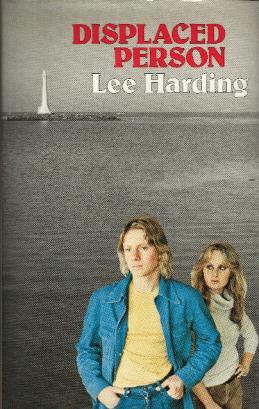
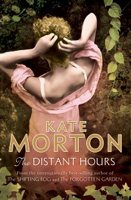 | Kate Morton, author of The Shifting Fog (aka The House at Riverton) and The Forgotten Garden, now has her third novel, The Distant Hours, published this week by Allen & Unwin. She was interviewed recently by Rosemary Sorensen for "The Weekend Australian". |
The Distant Hours begins with a prologue quoting a (fictional) classic tale called The True History of the Mud Man, written by the father of three spinster sisters living in the crumbling Milderhurst Castle in Kent. Then, the story's narrator, Edie (who Kate admits is in many ways much like the author), begins her part of the story.
"It started with a letter," she writes. "A letter that had been lost a long time, waiting out half a century in a forgotten postal bag in the dim attic of a nondescript house in Bermondsey." Going on to muse about the sighing of thwarted messages and letters that eventually "make their secrets known", Edie then laughs at herself, pleading with the reader: "Forgive me, I'm being romantic."
"It's not a self-conscious decision to write the way I write," Edie's real-life creator says. "It's what I like to read, so it's very natural to me. Before The Shifting Fog I'd written pretty crappy manuscripts, but when I wrote that one, I had no expectations of publication. I'd just had a baby (Oliver, now six), and I can be very honest, my thoughts and expectations about publication had dried up.
"As I was writing it, I said to Davin [her husband] many times, "This is really fun, but no one is ever going to want to read this. It's for me.' "